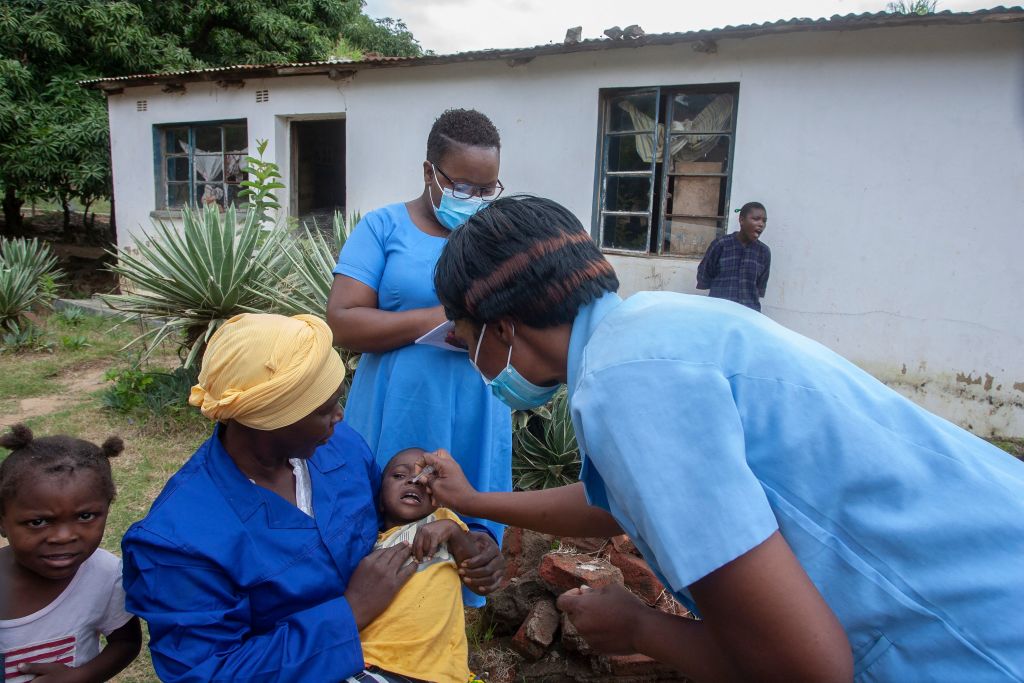Malawi is battling southeast Africa's 1st polio outbreak in 30 years, 'and yes, you should care'


A free daily email with the biggest news stories of the day – and the best features from TheWeek.com
You are now subscribed
Your newsletter sign-up was successful
Health officials in Malawi diagnosed polio last month in a 3-year-old girl who is now paralyzed, in the first wild polio case in southeastern Africa in 30 years. "And yes, you should care," Joanne Kenen writes in Monday's Politico Nightly newsletter. Malawi's small outbreak is an important reminder that "diseases that we scarcely think about and no longer fear, like polio or measles, can and do re-emerge."
Polio, an incurable virus that can kill or paralyze unvaccinated children, was declared eradicated in Africa in 2020, and Malawi's outbreak was genetically traced back to Pakistan, one of two countries, along with Afghanistan, where wild polio had not been eliminated.
"The rule of thumb is that if Malawi has diagnosed one child with paralysis, another 200 have been infected, somewhere, with less severe or asymptomatic polio cases," Kenen says, and how and when the virus got from Pakistan "to Malawi and who it affected along the way are not yet known." UNICEF last week started a huge vaccination drive to inoculate 20 million children against polio in Malawi and three neighboring countries.
The Week
Escape your echo chamber. Get the facts behind the news, plus analysis from multiple perspectives.

Sign up for The Week's Free Newsletters
From our morning news briefing to a weekly Good News Newsletter, get the best of The Week delivered directly to your inbox.
From our morning news briefing to a weekly Good News Newsletter, get the best of The Week delivered directly to your inbox.
"The Malawi case should underscore two things to a U.S. audience," Kenen writes, citing public health experts in and out of government. First, the COVID-19 pandemic "interfered with many ordinary — and necessary — primary and preventive health services at home and abroad. That includes routine childhood immunizations, like the polio vaccine." And second, she adds: "Vaccination."
"Vaccine hesitancy did not begin with the coronavirus," but "fear of vaccines has intensified and become more politicized during the pandemic," and "even before the pandemic, groups of conservative lawmakers in a few states attempted to weaken vaccination requirements for kids to attend school," Kenen reports. "Precisely because vaccines have been so successful in eliminating these childhood diseases, people have forgotten how dangerous those illnesses can be. ... That amnesia, that complacency, is a public health risk." Read more about polio and vaccinations at Politico.
A free daily email with the biggest news stories of the day – and the best features from TheWeek.com
Peter has worked as a news and culture writer and editor at The Week since the site's launch in 2008. He covers politics, world affairs, religion and cultural currents. His journalism career began as a copy editor at a financial newswire and has included editorial positions at The New York Times Magazine, Facts on File, and Oregon State University.
-
 How the FCC’s ‘equal time’ rule works
How the FCC’s ‘equal time’ rule worksIn the Spotlight The law is at the heart of the Colbert-CBS conflict
-
 What is the endgame in the DHS shutdown?
What is the endgame in the DHS shutdown?Today’s Big Question Democrats want to rein in ICE’s immigration crackdown
-
 ‘Poor time management isn’t just an inconvenience’
‘Poor time management isn’t just an inconvenience’Instant Opinion Opinion, comment and editorials of the day
-
 Trump HHS slashes advised child vaccinations
Trump HHS slashes advised child vaccinationsSpeed Read In a widely condemned move, the CDC will now recommend that children get vaccinated against 11 communicable diseases, not 17
-
 A fentanyl vaccine may be on the horizon
A fentanyl vaccine may be on the horizonUnder the radar Taking a serious jab at the opioid epidemic
-
 Health: Will Kennedy dismantle U.S. immunization policy?
Health: Will Kennedy dismantle U.S. immunization policy?Feature ‘America’s vaccine playbook is being rewritten by people who don’t believe in them’
-
 How dangerous is the ‘K’ strain super-flu?
How dangerous is the ‘K’ strain super-flu?The Explainer Surge in cases of new variant H3N2 flu in UK and around the world
-
 Vaccine critic quietly named CDC’s No. 2 official
Vaccine critic quietly named CDC’s No. 2 officialSpeed Read Dr. Ralph Abraham joins another prominent vaccine critic, HHS Secretary Robert F. Kennedy Jr.
-
 This flu season could be worse than usual
This flu season could be worse than usualIn the spotlight A new subvariant is infecting several countries
-
 FDA OKs generic abortion pill, riling the right
FDA OKs generic abortion pill, riling the rightSpeed Read The drug in question is a generic version of mifepristone, used to carry out two-thirds of US abortions
-
 Why are autism rates increasing?
Why are autism rates increasing?The Explainer Medical experts condemn Trump administration’s claim that paracetamol during pregnancy is linked to rising rates of neurodevelopmental disorder in US and UK
